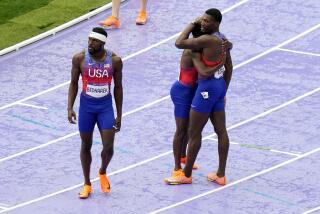Reynolds Runs, Fails to Qualify : * Track and field: International governing body threatens to suspend those who ran against world record-holder.
- Share via
NEW YORK — It could be a case of rule-book rattling, but the International Amateur Athletic Federation threatened to suspend athletes who competed Thursday against quarter-miler Butch Reynolds and indicated that it might take action against track and field’s U.S. governing body, The Athletics Congress.
Although not oblivious to the hand-wringing he was causing, Reynolds, the world record-holder in the 400 meters who was suspended for two years by the IAAF for allegedly failing a test last August for anabolic steroids, was insistent upon taking his legally earned place at the starting line.
“I’m running; I’m running,” he said at a news conference before the first round of qualifying for the 400 meters in the USA/Mobil Outdoor Championships at Downing Stadium.
“People say, ‘Butch, you’re going to run a 47 (seconds) or 48.’ I don’t care. Even if I run it in 60, it’s a victory for me just to be here.”
He will have to be satisfied with a Pyrrhic victory. Hours later, wearing his 1988 U.S. Olympic uniform because all of his sponsors have deserted him, Reynolds, 27, finished seventh in an eight-man field in the second heat and failed to qualify for today’s semifinals.
His time was 47.40, significantly slower than the 43.29 he ran in 1988 to break Lee Evans’ 20-year-old record but perhaps not so bad for someone who has had only one track workout in nine months.
“I didn’t break down,” said Reynolds, the silver medalist in the 1988 Summer Olympics. “I just didn’t have that extra extra.”
Because he did not finish among the top three here to earn a berth on the U.S. team for the Aug. 24-Sept. 2 World Championships in Tokyo, his future is uncertain. It has been suggested by U.S. Olympic Committee officials that he would be eligible for the July 12-21 U.S. Olympic Festival in Los Angeles. He said Thursday that he would accept if invited.
But he is taking the road to clearing his name and returning to international competition one step at a time. In his case, the first step was to appear before the American Arbitration Assn., which ruled last Friday that he was eligible for this meet because of questions about the validity of his positive drug test for the steroid nandrolone after an Aug. 8 meet in Monte Carlo.
According to the Amateur Sports Act of 1978, a federal law that defined the relationship between the USOC and the independent governing bodies for the sports under its umbrella, athletes have the right to binding arbitration in disputes.
“If we enact arbitration, they’re bound by it,” USOC spokesman Mike Moran said of TAC officials. “It’s in our constitution and theirs.”
TAC, however, also has to answer to the IAAF, the international governing body for track and field. IAAF officials said Thursday that further review has confirmed Reynolds’ positive test in Monte Carlo and that Rule 53.2 would be enforced if he competed here.
The so-called contamination rule states: “Athlete shall be declared ineligible if he has taken part in any athletic meet or event in which any of the competitors were, to his knowledge, ineligible to compete under IAAF rules.”
There were 19 other quarter-milers entered here, including 1988 Olympic champion Steve Lewis and bronze medalist Danny Everett. Everett was in Reynolds’ heat.
TAC Executive Director Ollan Cassell said Wednesday that TAC would bow to the arbitrator’s decision because U.S. law takes precedence over IAAF rules.
The IAAF was not satisfied with that response.
“We pointed out that every IAAF member undertakes to respect and follow the rules of the IAAF,” IAAF spokesman Franco Fava said. “Any departure from this principle may well endanger the continuing membership in the IAAF.”
TAC responded to that by allowing Reynolds to run.
“The IAAF has the authority to take sanctions against us if it wants to,” Cassell said Thursday. “I would be surprised if they did. In view of what our laws are and their rules are, we had no choice but to allow Reynolds to run unless we wanted to go to jail or be held in contempt of court.”
More to Read
Go beyond the scoreboard
Get the latest on L.A.'s teams in the daily Sports Report newsletter.
You may occasionally receive promotional content from the Los Angeles Times.






